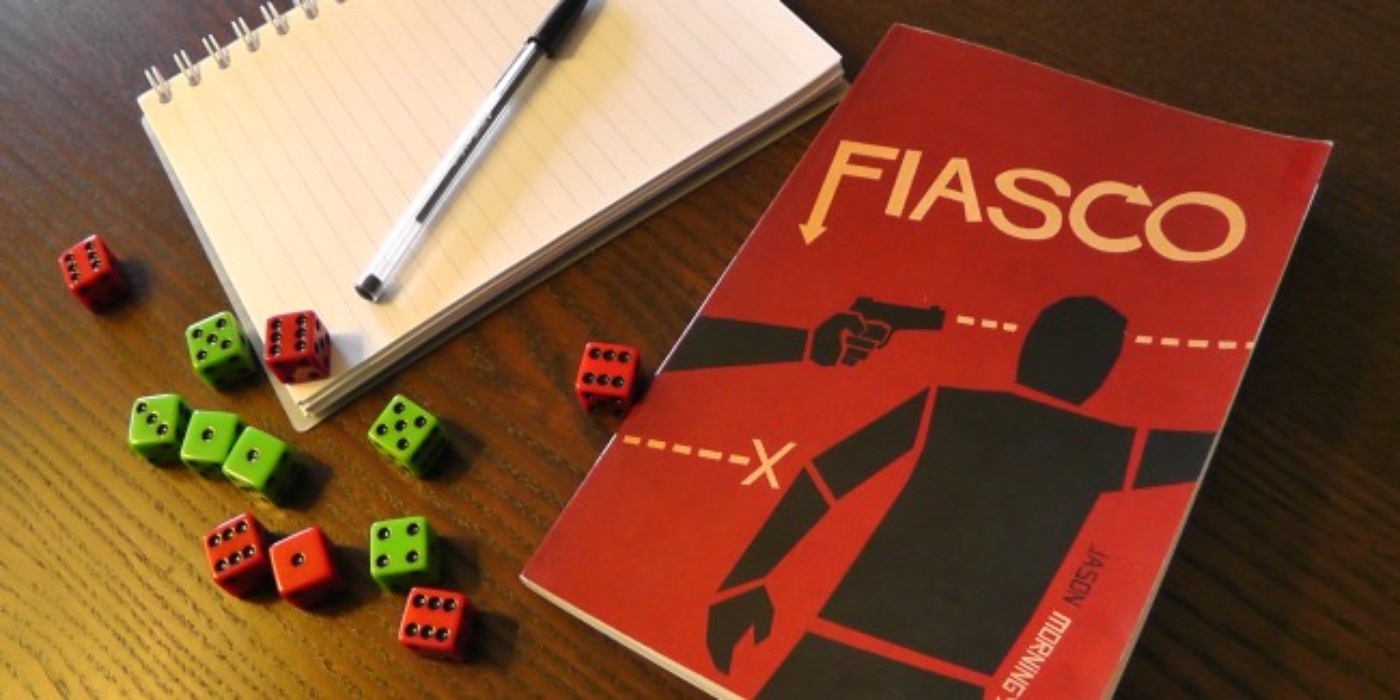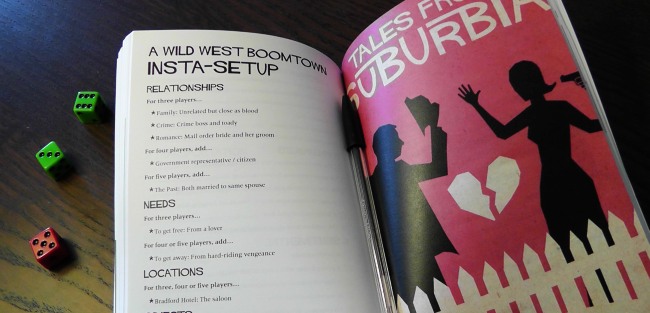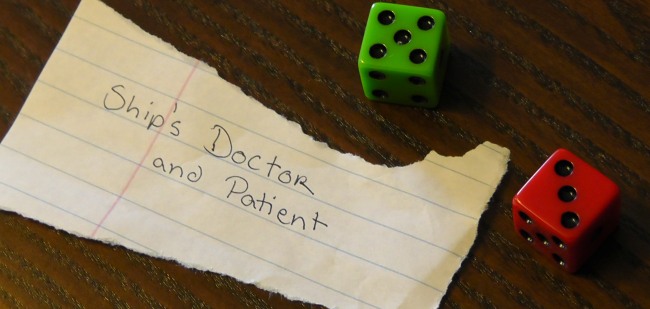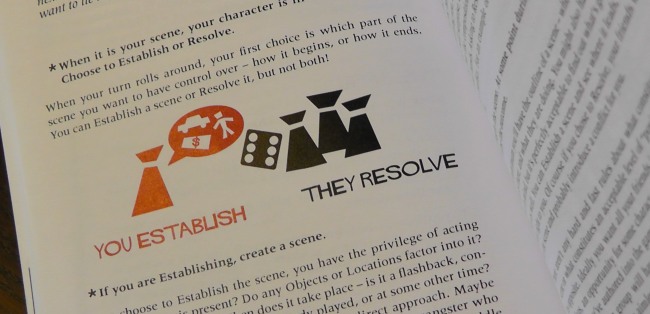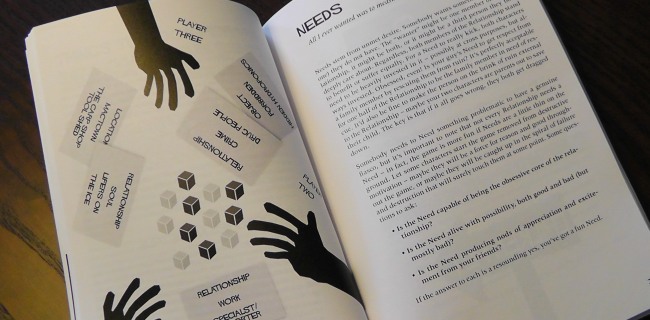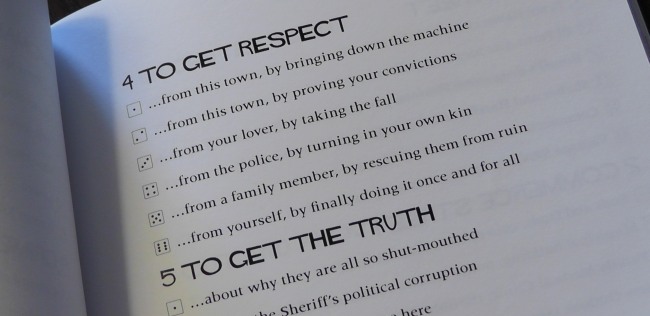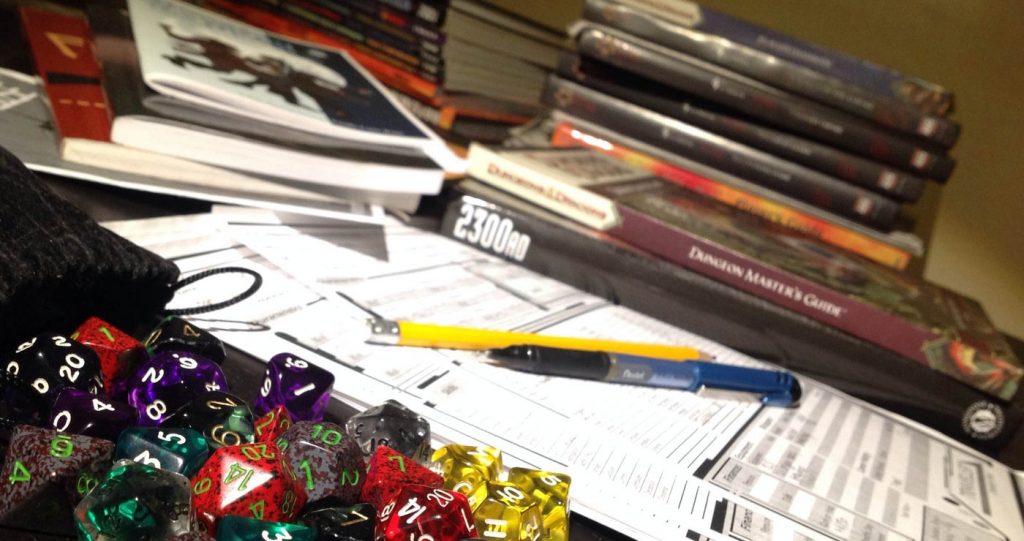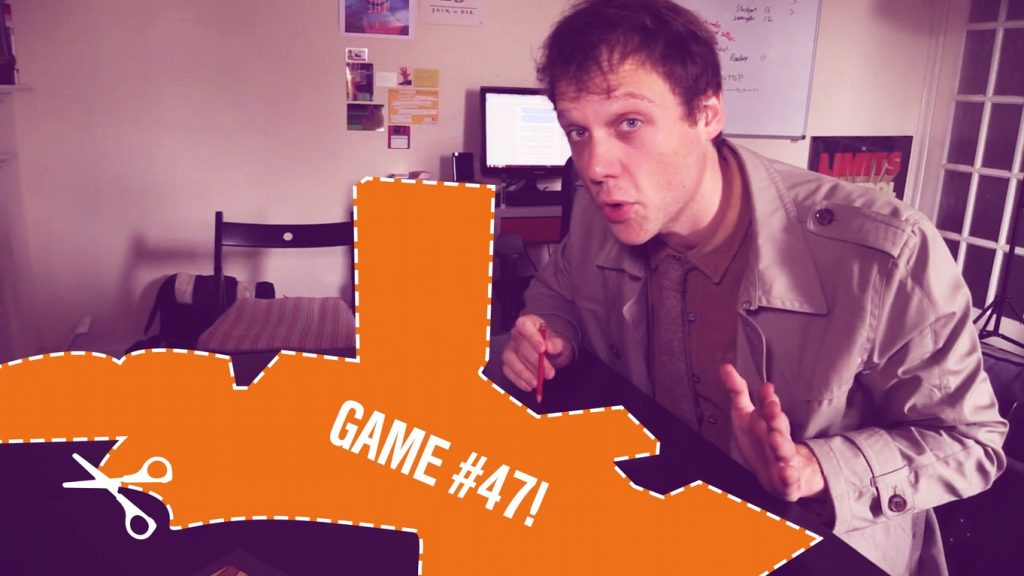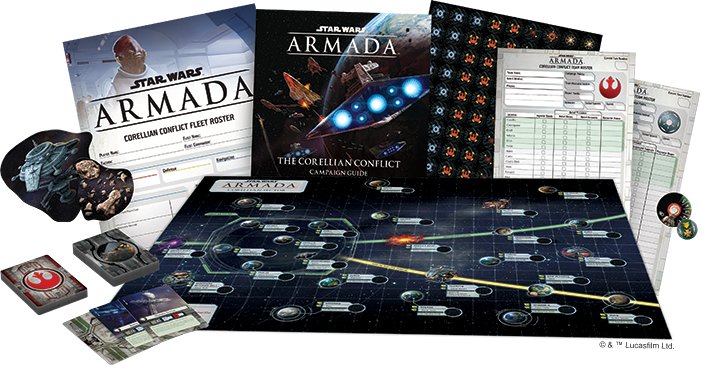Quinns: Listen up, ladies. Fiasco: A Game of Powerful Ambition & Poor Impulse Control (which you can buy from that same link) is very much outside the realm of what we usually cover. It’s a two hour table game, but it has no cards, cardboard, winners or losers. It has almost no rules. But despite that, it’s perhaps the best game you’ve never even conceived of.
All you’re paying for here is a very thin, very affordable book. And with this book, you and some of your friends are going to roleplay your evening away. And you’ll laugh like garbage disposal units doing it.
Yes, roleplaying. As in, Dungeons & Dragons. As in you describing what you do to the rest of the table. “I swing my sword at the orc!” before you roll dice and the dungeon master consults his charts, like some omnipotent medieval calculator, before telling you that the orc’s kneecap goes clattering away down a staircase.
The first two things you should know about Fiasco are: One, there’s no dungeon master. Everyone plays together. Two, Fiasco doesn’t simulate adventures. It creates hilarious, disastrous crime capers that will stick in your brain like chewing gum. For the rest of your life.
Paul: The game begins to go to hell right at the start, which is absolutely fine.
Each Fiasco scenario has the players roll a set of dice and then take turns allocating each of these dice rolls to a detail. It might be a relationship between two of the players (“Rival amateur drug dealers”), a location, need or object. You all get in on this, one after another, like drunken beavers throwing together a dam. And that dam is going to be you, you big mess, and everyone’s going to watch you collapse.
Quinns: When Paul says “scenario”, what he’s referring to are Fiasco’s “playsets”. These are both your movie’s backdrop and the engine that’ll drop details for you to assemble like some kind of jigsaw-dispensing slot machine, whether you want to play the employees of a terrible local news channel, British gangsters, or – our personal favourite – the staff of a zoo that’s facing bankruptcy. For example, here you’ll find the charts for Transatlantic, a playset set aboard a passenger liner travelling between New York and Southhampton in 1932. Sound dry? Yeah. Take a look at those charts again. Specifically, look at the section titled “Needs”.
“Needs… revenge… she humiliated you and now she’s rooming across the hall.”
“Needs… to survive… the duel, because that’s not how things were done back home.”
At the most basic level, here’s how the set-up might work for the above playset…
*Paul: OK, I’ll use this dice roll of “2” to create the “Friends…” relationship between Quinns and Millicent.*
*Quinns: It’s my turn? I’ll use this “4” to finish it with “Friends… from the Great War.”*
*Millicent: What? So we’re war buddies? OK, I’ll add an object to our relationship. I’m using this “6” to create a “Sentimental…” object.*
*Paul: Amazing. I’ll use the last “1” to make that sentimental object a “Filigreed urn, heavy with ashes”.*
*Quinns: The ashes of our old war buddy, maybe? We’re heading back to Europe to spread them where he was happiest.*
*Millicent: At war?!*
*Quinns: Of course! OK, I’ll take that “5” to create the “Courting…” relationship between me and Paul.*
*Paul: …*
*Millicent: Ooooh! Taking the “1” to finish it with “Confirmed bachelor and his bachelor companion!”*
*Paul: …*
Quinns: …and that example hasn’t even got to the all-important “needs” yet. By the time you’ve chopped your dice into as many details, the table will be groaning under the metaphorical weight of the tiny scraps of paper you wrote your choices on. Then it’s time for the real fun. You all work together to figure out who your characters are, linking the relationships together into a literary daisy chain (“OK, so I’m sleeping with her because she likes my car, but really I want him…” “So I’m running the arctic research base myself? And you’re my new assistant, desperate to achieve fame at any cost, and he’s my autistic son…”).
I’m not speaking a word of a lie when I say at this point you’ll already be staring a potential movie in the face. A terrible, or perhaps fabulous, movie. It could go either way. That’s down to what you do next.
Because then? Then the game proper begins.
Paul: Players begin taking turns to throw their lop-sided characters in the spotlight. You finally start roleplaying, which in Fiasco is a mix between a writer’s room and a terrible improv class. The bad news is, if you’re not comfortable pretending to be a reptile house keeper flirting with a work experience girl played by your brother, there is no way this beautiful game is for you.
The good news is, unlike a regular roleplaying game, the other players act as a support network. If you don’t know what your character would say or do in a scene, nothing stops you from asking the rest of the table about it. Everyone wants a good story, after all.
Not that you’ll have to try that hard. The single, simple idea that powers Fiasco like a nuclear reactor is that on your turn you get two options:
1. Set up the scene. You choose what’s happening, recruiting other players as supporting characters when needed. Problem is, this leaves the rest of the table free to decide whether the scene goes well or badly for you, by later sliding you either a white or black die from a pool in the middle. If you’re trying to convince someone to help you or stop hitting on you, whether you’re trying to disarm a bomb or bury a body, this will determine whether you succeed or whether you’re rumbled, arrested, shamed, accused, molested, punched, misled and so on. You control yourself, but not your destiny.
2. Resolve the scene. The rest of the table chooses what you’re doing, pulling your character into a situation that amuses them, but you get to pluck that white or black die from the central stash. You control your destiny, but nothing else.
In other words, while you still get a sense of control, everyone else will be trying to make every scene funny.
Importantly, you couldn’t “win” the game by resolving and taking white die after white die even if you were a jerk, because there’s an even split between white and black dice in the middle. Sooner or later, your story’s good luck will run out.
Those “needs” you picked earlier do the rest of the heavy lifting. With four or more players, everybody gets a need – a motive – that inevitably draws them into miserably planned capers like soiled water circling a drain.
And that’s it. That’s the entirety of Fiasco. You have four dice per player, each die is a scene, and when they run out, that’s the end of your movie.
You then roll the dice you’ve collected and check your result on a chart to see what happens to everyone’s characters (“A fate worse than death,” all the way to “You get everything you wanted”). In accordance with the rules of Coen brothers films, characters who’ve had good or bad luck (white or black dice) for the entire story get happy endings, but characters who oscillate between a mix of good fortune and bad calls get screwed.
Your endings are typically petty and unremarkable, but so too are your beginnings, your scenes, perhaps even your goals. Fiasco isn’t epic roleplaying, it’s small time co-operative chaos. You could literally be bickering over biscuits. One of the fan playsets we’re desperate to try casts the players as the staff of a suburban chain bookstore that’s closing down.
Quinns: Well, there is one other rule. Half way through the game you roll on a huge “Tilt” table full of ominous sayings like “That thing you thought was taken care of? It wasn’t.” and “Love rears its ugly head,” just to ensure the “wheels start coming off your story,” as the book puts it, but that’s it.
Reasons to buy Fiasco, then.
One, it’s as fun as every other game we’ve ever covered on SU&SD. Two, it’s wonderfully memorable. But most importantly of all- three, it works.
It’s alchemy. In every game of Fiasco I’ve played, those bare-bones rules have given birth to scenes that wring my soul like a damp cloth. The world’s slowest, most protracted car chase where the fugitive can’t drive stick. A tragic starlet flinging herself from the bow of a cruise ship, only to shatter her pelvis on the deck below. Or, best of all, Paul and myself having to act out-
Paul: We didn’t quite-
Quinns: -we actually assumed the roles of a closeted middle aged Southern man and the young, gay employee of his tanning salon as they both watched Avatar on DVD. My predatory kid gradually wearing away Paul’s inhibitions. A creeping hand here. A comment on the sexiness of the Na’vi there. Our eyes meet… we look away…
All of this was just spoken, of course. But the chemistry was there. You could feel it, like the heat coming off a CRT monitor.
But this was just one scene. A single play in my character’s larger scheme, which I can still recount scene by scene. I was trying to seperate him from his wife and become joint-owner of the tanning salon. Reaching for the stars, that’s me.
Paul: Time and time again, the game just builds bizarre personalities and then puts them in a space where they can’t help but pinball off one another in the weirdest ways as your shared storytelling ricochets around the table. It’s such a fresh, exciting and ridiculous experience, a thousand miles removed from conventional roleplaying. Sometimes it bounces you out of your comfort zone, giving you an entirely unexpected outcome, and this is great.
Quinns: Yes.
Let’s get down to brass tacks. What Paul’s saying is that Fiasco is a game that can force your friends to act out the role of embittered exes, married couples, or hot seductions. Whether the friends in question happen to be boy/girl, boy/boy or girl/girl, and whatever the genders of their characters, this is more fun than most board games can dream of eliciting. That alone is a reason to slap down cash for it right now.
But stretch your imagination a little further. Imagine a pair of your friends playing the role of bon vivants, amateur bank robbers, thieving construction workers, the collective soul of a touring rock band. Imagine you and your friends sitting around a table, arguing (in character) about what to do about the dead body of the manager of your bookstore when your prank goes wrong.
And, and the creators post a new playset every month, with the game’s fanbase creating even more. Who do you feel like arsing around as tonight? Because those playsets stretch as far as 1950s pulp sci-fi, the crew of a stranded submarine or a motel in such backroad America that one of the needs is “Needs… to get laid… to propagate your superior bloodline,” and one of the locations is “A flyspecked windowsill”.
Paul: Or just invent your own playset. Then post it on the wiki following these guidelines, for the enjoyment of all.
If you don’t think you’re going to like Fiasco, then you probably won’t. Fiasco won’t be for everyone and it’s a quaint little devil, a motorbike you must first kickstart with positivity, creativity and, if you’re English, alcohol. But if you’re not sure if it’s for you, then I think you should absolutely get it. Give it a go. Roll your dice, make your mismatched characters come to life and put them in a car that every passenger is fighting to steer, careening closer toward that cliff edge with each new yank of the wheel.
Quinns: Imagine not just laughing with your friends for two hours, but – and I’m not saying this will happen with every game of Fiasco – walking away from an evening’s gaming with the outline of a screenplay you’d actually watch.
When a group of Fiasco gamers is “on”, and I mean really “on”, with terrible accents and shimmering ideas and affordable alcohol everywhere you look, it is absolutely, unquestionably my favourite game ever.
Hell. You know what I’m going to do right now? I’m going to order the Fiasco Companion. I want to give these guys more money, but I also want to see what they have to say about taking your absurdity seriously.
Billy Pulpit Games? We salute you. And we hope this is a fitting thanks for the gift you’ve given us.

